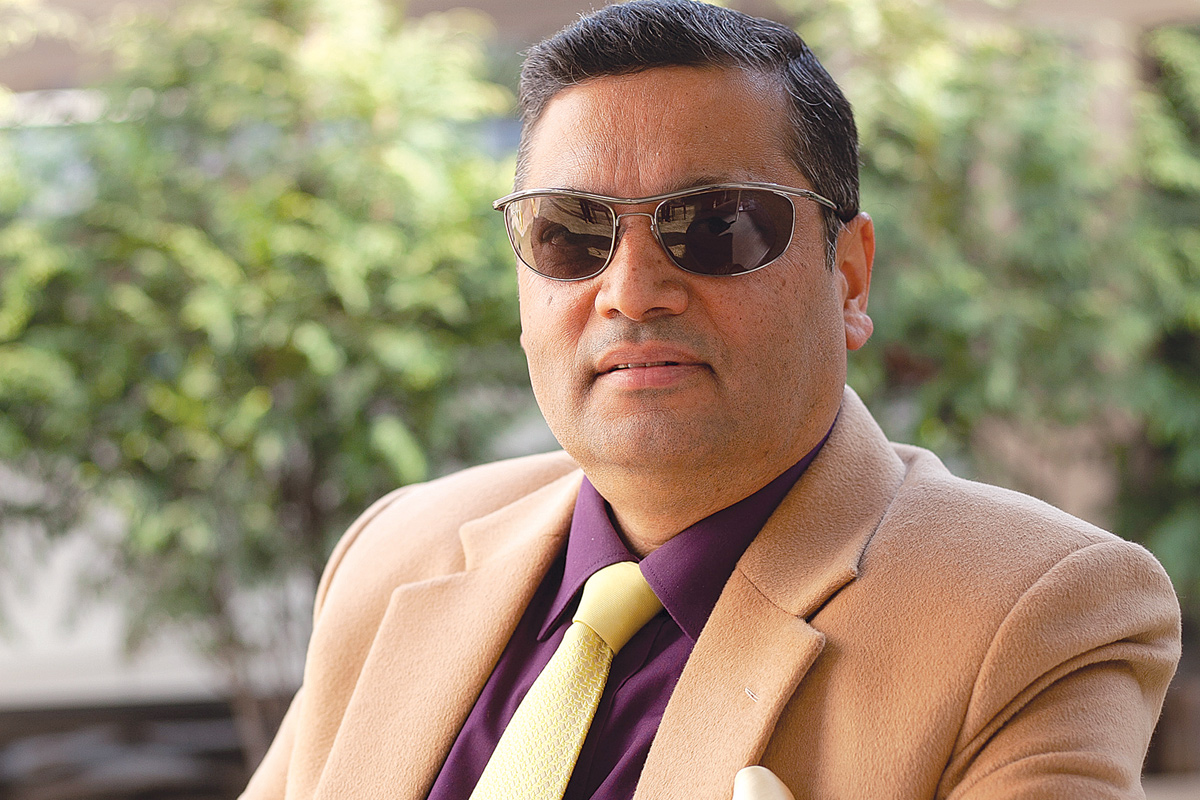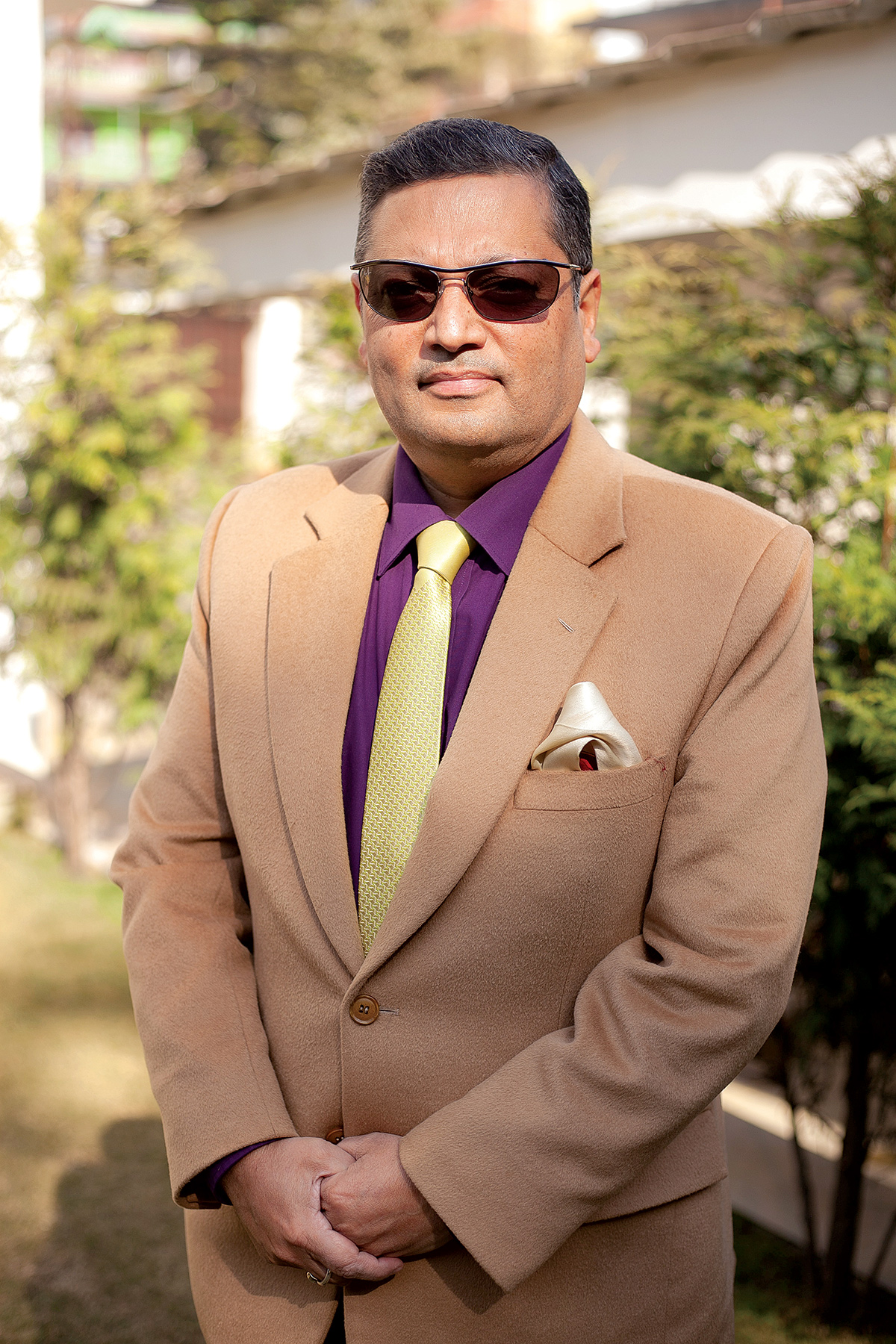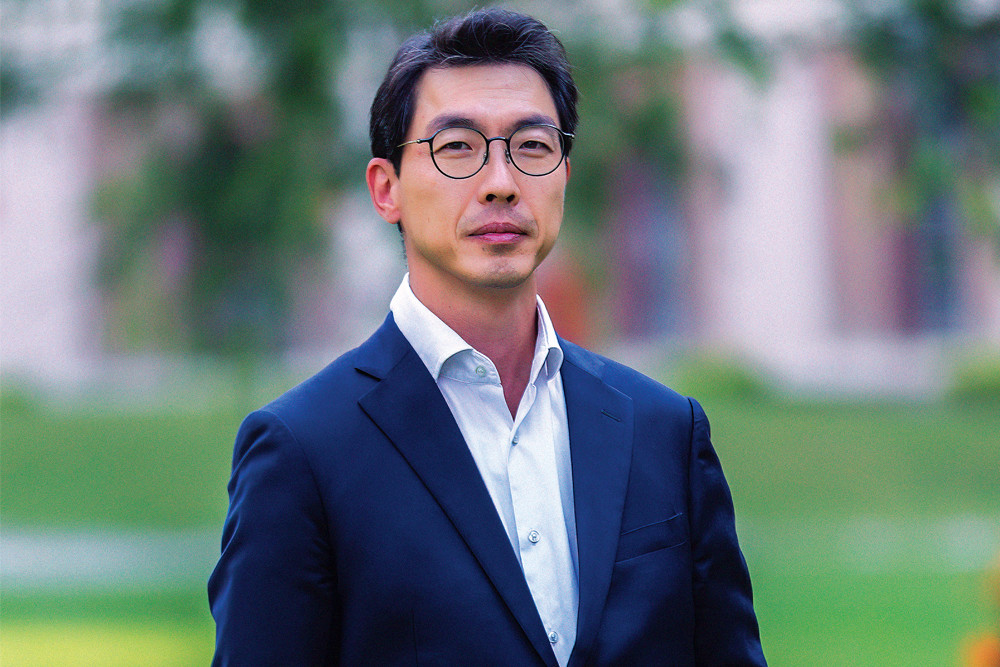
Dr Nishchal N. Pandey is the Director for Centre for South Asian Studies, Kathmandu. He is also Nepal Chairman of South Asia Foundation (SAF) which is an apex body of SAARC. South Asia Foundation offers scholarships to deserving students to study in South Asia.
Dr. Pandey is a well-known academic, a foreign affair expert and was the Executive Director, Deputy Executive Director and Research and Documentation Officer of the Kathmandu based Institute of Foreign Affairs where he worked for eight years from 1998 to 2006. He was also Advisor to the National Planning Commission, taskforce member to draft the ninth five-year plan of the Nepal government and Sub-editor of The Rising Nepal daily.
Dr. Pandey received training on Leadership at the Harvard University, Kennedy School in 2015 and was a visiting research fellow at ISAS, Singapore, at University of Hull, UK (2009) and SWP, Berlin (2013).
Dr. Pandey is the author of Nepal’s Maoist Movement and Implications for India and China (2005) and India’s North-Eastern States: Insurgency, Economic Development and Linkages with South East Asia (2008). In addition, he has edited and co-edited an additional dozen books including Nepal as a Transit State: Emerging Possibilities, Trade Facilitation: Nepal’s Priorities, Nepal-China Relations, Nepal-Japan Relations, Nepal and the United Nations, Labor Issues and Foreign Policy, New Life Within SAARC and Comprehensive Security in South Asia. Additionally, he has also authored over three dozen research papers and articles to internationally reputed journals, books and periodicals.
In an interview with B360’s Avant Shrestha, Dr. Nishchal Nath Pandey talks about his career and works with the Center for South Asian Studies, the global interest in South Asian Studies, Nepal’s economic diplomacy, the issues with the MCC project and the future of China, India and Nepal’s relationship. Excerpts:

Could you briefly tell us about your journey with Center for South Asian Studies?
I was the Executive Director for Institute of Foreign Affairs; a research think tank under the Ministry of Foreign Affairs for nine years from 1998 to 2006 in various capacities. Then I moved to Singapore as a visiting research fellow at the Institute of South Asian Studies, at the National University of Singapore. Upon my return, we thought of having an autonomous research think tank in Nepal, which we believed that there was a dire need for. Along with a few friends, we set up the Center for South Asian Studies in 2008. So basically, CSAS was founded in 2008 as an autonomous research think-tank. It conducts seminars and regional conferences on foreign policy issues, SAARC and BIMSTEC and other issues of importance to South Asia. We are also the convener of Consortium of South Asian Think-Tanks (COSATT). The Konrad Adenauer Stiftung (KAS) supports the COSATT. We also bring out publications, some of whom are in University curriculums. In addition, we have been conducting conferences and seminars on South Asian regional cooperation, conflict resolution and we are lucky enough to have dedicated partners since the very inception. Currently, we have been conducting lots of good work and in fact we are now recognised in the global think tank report that is brought out by the University of Pennsylvania every year as one of the top think tanks in the Asia Pacific region. This year we have been ranked as 63rd top think tank in the Asia pacific region by that report.
Could you elaborate on the work CSAS does?
Well as a research think tank, CSAS does research and publications and does events on matters that are important to the nation and the region. For instance, issues such as climate change, disaster management, issues on regional cooperation in South Asia, youth radicalisation, combating trafficking to name a few that are important to the nation and the region. And the current issue is also on the topic of Indo-Pacific which I think is an important topic to discuss about. So, we have been conducting conferences where we bring experts from the whole region including Germany. We conduct events where papers are presented and later, we publish these papers in a book form. These books are also referred to and become a part of university curriculum. Plus we disseminate our research findings to a wider public through website, kindle and other applications and modern technology. I am also the Chairperson of Nepal for South Asia Foundation. Our organisation gives scholarships with the ambition that Nepali students can go to and study Fine Arts in Lahore, Pakistan or study Green Energy Technology in Pondicherry University or Journalism in Asian College of Journalism in Chennai.Previously you have given talks on South Asian studies in the contemporary world and on how South Asian studies is getting international recognition. Where does South Asian stand and what does this mean for our culture in terms of international recognition?
That is a good question. We are a vibrant region. South Asian middle class itself is the second largest market in the world. We are a great investment destination. Our population is agile and very young. For example, if you observe the ethnicity of professors in the world renowned universities, you will find that most of the professors are from South Asia. Even the students are from South Asia, but the only thing is that the universities are in Europe or America or Australia. Plus, I think the real tragedy of our institutions back home is that we have politicalized our universities and therefore our students tend to go to Australia, Canada, United States and Europe. We have not given priority to the education sector and as a result this has happened. But like I mentioned, the faculty and the majority of the students in the international university will be South Asian. But South Asian studies in itself is becoming a sought-after topic worldwide. There has been an increase in interest among Western students to peruse subjects in South Asian language, food, cinema, culture and religion. For example, there are lots of universities where Sanskrit is taught in the US. I have personally met an American lady who was doing her PhD on Goddess Saraswati. So, this is almost an irony that Westerners are interested in our subjects whereas we have been neglecting it. And I think this has a lot of scope because our language is going to be very important as there is going to be much investment in this region. World renowned companies are going to come here, so they will want expertise so I think this is going to be important. We have to wait and observe what happens in the future because it depends on the government policies also.While there is a global interest in South Asian studies, in Nepal we seem to be losing interest in our own heritage, language and culture. How do we understand this?
I think the real problem is in terms of the entire society and the country as we are politically unstable. There was hope that with the two third majority in the parliament, the present government would be able to give direction to the country. And some semblance of stability was also visible but then we have gone back to the same rut. When there is going to be political instability, there is going to be instability of policies. We are going to have a bad image internationally. Our political upheaval is staring just now. Protests are starting just now and this is happening post pandemic. Look at the tragedy, for the whole one year we were closed and now we are just beginning to open up and the protests have started. So, this is going to hit the economy, this is going to completely finish off the tourism sector and this is going to create a bad image internationally. Therefore, I think first of all political stability is a must and I think other areas of statehood like foreign policy are going to take the back seat when politics is unstable. Nepal’s international relations exercise is very old. We established diplomatic ties with the UK and the US before we established diplomatic relations with our own two immediate neighbours. We need diplomatic finesse and a national consensus to safeguard our territorial integrity and sovereignty and reap maximum benefits from the current world disorder. The current international and regional situation is not conducive to small and land-locked countries like Nepal. The Covid 19 pandemic has compounded the challenge for us. In the midst of this crisis, parliament has been dissolved and the possibility of political instability looms large. This could not come at the worst time. This is the time for our political leadership to rise up to the challenge, favour merit over near and dear ones for major positions, streamline the government, and also strengthen our embassies abroad. All our institutions - whether they are universities, embassies, government corporations or even the judiciary are suffering from cartelisation and party affiliated persons occupying major positions.Your book Security and Economic Challenges in the Indo-Pacific discusses about the Millennium Challenge Corporation (MCC) for Nepal. Could you give us some insight in light of the protests we keep hearing? Is the United States attempting to create a geopolitical advantage in Nepal? How would it be beneficial or detrimental to Nepal?
The book is not entirely about MCC, it’s about the Indo-Pacific. The Indo-Pacific is the terminology used by the US for Asia Pacific. What used to be Asia Pacific now they have started to use the terminology Indo Pacific. So, there is also the Indo-Pacific Strategy laid down by the Trump administration. We are not sure if Biden Administration is going to continue using the terminology Indo-Pacific. “What does Indo-Pacific mean for South Asia?” —This was a pioneering study that we conducted from experts from India, Bangladesh, Sri Lanka and Nepal. And we also have some German presenters to present their views on the terminology of Indo-Pacific. And I think this book is a pioneering effort in that line.So, which comes first, India or China? I think the priority should be ‘Nepal comes first’. Our national interest is going to come first whether we are going to match our interest with India or China or the US or the EU.Secondly, on the question of MCC, I think we have totally politicised the issue. Our ruling party sometimes also functions as the opposition party. And within their own party there was a lot of wrangling on this particular issue. When there was a parliament, we could not ratify it. Now the parliament stance is dissolved. If the parliament is reinstated, it is going to reemerge as a ‘hung parliament’, so the same problems will emerge. And if we are going to wait for elections, we have to wait for a long period of time. The MCC is a classic illustration of how our political leadership cannot take decisions on major issues of foreign policy and instead takes them to the streets in order to create political controversy. If the MCC is needed for development, why the delay in ratifying it? If it not in our national interest for various reasons, why don’t we reject it? Lingering on, hurling one accusation after another only jeopardises an enabling environment and frustrates the international community.
Economic diplomacy basically translates to knowing how to utilise the country’s comparative advantages by recommending appropriate measures and strengthen policies to achieve these objectives? Has Nepal been able to fully utilise our economic tools to achieve national interest?
All these tools of diplomacy including economic diplomacy only comes into full play when there is political stability and when there is something to project abroad. So, when the country is passing through political instability then foreign policy itself becomes a second priority. Right now, foreign policy is second priority. Political stabilization is our first priority for the nation. Of course our foreign affairs have to be strengthened, our conduct of international relations has to be made better, we have to send envoys who are going to sincerely and actively lobby on behalf of Nepal wherever they are stationed. We need more budget to spend on our embassies. So therefore, there are whole lots of issues that are there. A high-level task force was formed by the Deuba cabinet and I was a member of that to discuss on Nepal’s foreign policy and the changes and reorientations that are required. And we submitted the report. unfortunately, we are not sure if the report is anywhere in the priority of the present government. The book Security and Economic Challenges in the Indo-Pacific mentions that China and India historically had interest in Nepal. Modern rise of China and India as the two main pillars of the new Asian century has elevated the historic interest to a whole new level of geo-political, socio-economic and strategic significance. Please elaborate. India and China are going to be the major players of the Asian Century. When you talk about the Asian century, India and China are going to be the major fulcrums of that Asian Century. We are situated between these two rising giants of the 21stcentury and we should have clear cut policies on how to reap the benefits out of their economic development. For example, look at China now, even after the pandemic their economy has sprung up again so quickly. WithmIndia we have religious, linguistic, matrimonial, cultural, historical and spiritual ties. We should bank upon that kind of relationship with India on which we have huge constituency, the Hindu constituency. Otherwise what happens is that everybody is trying to lobby with Delhi and Beijing and we will eventually fall behind if we do not actively engage ourselves with Delhi and Beijing because they are huge market, huge players of the 21st century.The close friendship we enjoyed with India in the past is not the same, so will we be losing more friends if we join China in the BRI project?
No, because we do not know who is going to come out victorious in this post-cold war period, so therefore we must engage ourselves with everybody but we should always have national interest in our mind. So, which comes first, India or China? I think the priority should be ‘Nepal comes first’. Our national interest is going to come first whether we are going to match our interest with India or China or the US or the EU. So of course, we are part of the BRI and we are part of the AIIB (Asia Infrastructure Investment Bank) which the Chinese have put forward. Plus, we are also a part of the Indo-Pacific and we are part of many such connectivity projects initiated by India. We are part of multiple pacts that has our national interest and that are connected with our country, so we should take benefit from everybody and we should not corner ourselves in a situation where we are lacking in friends, because we have a rich history of our engagement with the outside world.Nepal has been too reliant on foreign grants and aid from developed nations. Do you think we are at all working towards self sufficiency?
Aid is important in a phase where we are trying to take off. And especially during the post-earthquake and currently during the pandemic situation, we really do need the support. We are really grateful to the Government of India for giving us these Covid vaccines which I believe will make us safer. So, we need aid and support in times of need. But we should also aim for a situation where we do not need unnecessary aid in areas where we are already self-reliant. For instance, on issues like empowerment of certain communities and battling discrimination against certain communities, I think these are areas where our constitution has already given sufficient space and priorities to these secluded groups, castes and creed of the society. So, we should also be focusing on issues like infrastructure.What kind of changes do you foresee President Joe Biden’s term bringing for Nepal?
That is very important, however we really have to see how the Biden administration approaches South Asia. It has given all the positive fillers as of now because it has announced that it wants to engage with multi-lateral institutions. The administration is joining WHO, it is joining the Climate Change Initiatives that United States during the Trump administration was shunning. Trump Administration had the policy of ‘America First’ and that led to losing out on many friends internationally but now I believe that the Biden Administration will focus more on Afghanistan and India as far as South Asia is concerned. But then the smaller countries in the region are also important to them. At the moment, the Biden Administration has its plate full because of the pandemic, the economic recession, relationship with China, but then we will have to see ourselves and fit ourselves into the main priorities of the Biden Administration.
Published Date: February 22, 2021, 12:00 am
Post Comment
E-Magazine
RELATED Face 2 Face



.jpg)
.jpg)
.jpg)